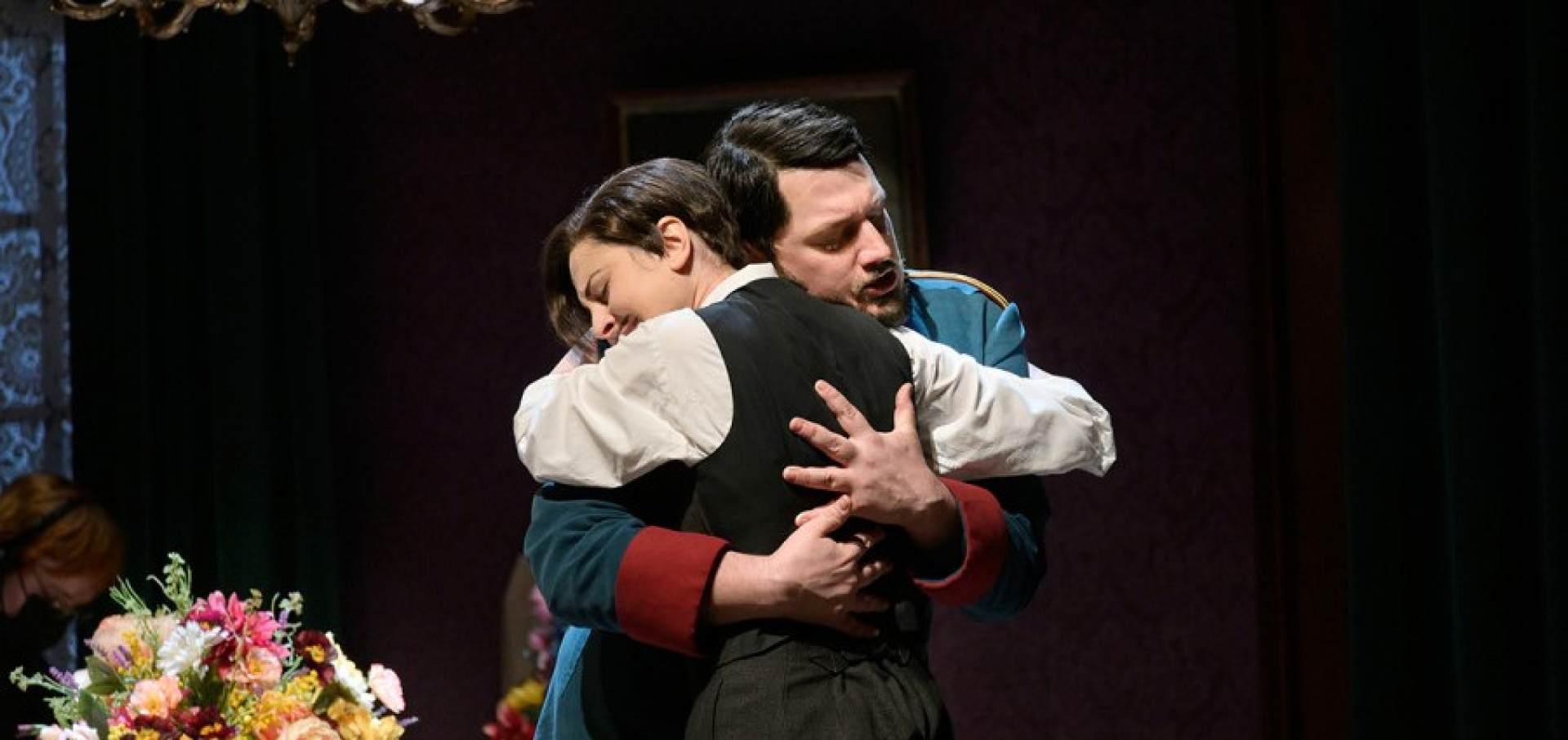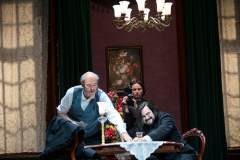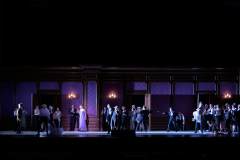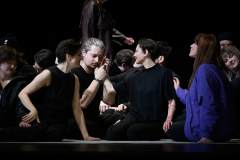Arabella
Mo | Tu | We | Th | Fr | Sa | Su |
Richard Strauss in March
Arabella - Richard Strauss [1864 – 1949]
Lyrical Comedy in Three Acts
Poem by Hugo von Hofmannsthal
First performed in Dresden on 1 July 1933
Premiere at the Deutsche Oper Berlin on 18 March 2023
Recommended for ages 15 and up.
Duration: approx. 3 hours 30 minutes | Two breaks
In German with German and English surtitles
Pre-performance lecture (in German): 45 minutes prior to each performance
Synopsis
Time: 1860s
Place: Vienna
Act 1
In a hotel in Vienna
As the curtain opens, Countess Adelaide is having her fortune told. The fortune teller predicts Arabella will marry a man from far away, but that trouble may be in store. The Waldners have a second daughter, Zdenka, but since they cannot afford two daughters marrying, they have indulged her tomboyishness by pretending she is a boy, whom they present as "Zdenko." Zdenka secretly loves Matteo, a penniless officer who loves Arabella. To prevent him from committing suicide, Zdenka writes him love letters she signs with Arabella's name. Zdenka reproaches Arabella for her unsympathetic treatment of Matteo, but Arabella says that she is hoping for the "Right Man," to whom she can give her heart completely. Meanwhile, Arabella is wooed by three suitors, Elemer, Dominik and Lamoral, and acknowledges that she may have to accept one of them, but has fallen in love at first sight with a stranger she passed in the street.
Count Waldner, in dire straits, has written to all his friends for financial help, to no avail. He was hopeful for an answer from an old and immensely wealthy Croatian friend of his, Mandryka, even sending him a portrait of Arabella in hopes of a marriage. A visitor announced as Mandryka arrives and Waldner is surprised to see that it is not his friend. The man explains he is Mandryka's nephew, also named Mandryka. His uncle is dead, and as his only heir, he has acquired his fortune; he also received the letter and portrait. From seeing the portrait, he has fallen in love with Arabella. He offers to marry her and gives Waldner money.
A carnival ball is to be held that night. Matteo asks "Zdenko," his supposedly male friend, when he will receive another letter from Arabella; "Zdenko" answers that he will have one that very evening at the ball. Arabella continues to muse about the strange man she noticed, but when Count Elemer arrives to be her escort for the evening, she tries to banish these thoughts and look forward to the excitement of the Fasching.
Act 2
In a ballroom [The Coachman's Ball]
Arabella meets Mandryka, who turns out to be her fascinating stranger. Mandryka tells her about his life and his country's customs, in which young women offer their fiancés a glass of water as a token of agreeing to be married. Mandryka tells Arabella that she will be mistress of all the things he owns, and that she will be the only thing ranked above him besides the Emperor himself; Arabella happily agrees to marry him, saying, "I give myself to you, for eternity." Then Mandryka agrees to Arabella's request that she be allowed to stay for another hour to say farewell to her girlhood, during which she thanks her suitors for their interest in her and bids them goodbye.
Meanwhile, Zdenka gives Matteo a letter with the key to the room next to Arabella's, saying that it is Arabella's room and promising that Arabella will meet him there that night. Mandryka overhears this conversation and, mad with jealousy and disappointment (after first trying to evade these feelings), raises a commotion, flirting with the Fiakermilli, the ball's mascot. Since Arabella is nowhere to be found, the Waldners insist that he meet Arabella to talk things out, and they head for the hotel.
Act 3
A lobby in the hotel
A passionate orchestral prelude depicts the lovemaking of Matteo and Zdenka.
Arabella enters the lobby and comes across Matteo. As Matteo is in love with Arabella and thinks it is she with whom he has just made love in a darkened room, their conversation is at once confused and emotional. The Count, the Countess, and Mandryka arrive and further the misunderstanding. After Mandryka accuses Arabella of infidelity and plans to go back to his land, Zdenka rushes in, no longer in disguise and in her negligee (making it clear that it was she who had the encounter with Matteo). She declares her intention to drown herself in disgrace. The situation is finally cleared up. Matteo learns that the letters were forged by Zdenka and that it was she and not Arabella in the room. He suddenly realizes he is in love with Zdenka, whom he agrees to marry. Mandryka begs forgiveness, and Arabella tells him they will think no more of the night's events. Arabella asks his servant to bring her a glass of water, and Mandryka thinks she has requested it for her refreshment. Arabella goes upstairs and Mandryka, ruminating on his indecorous behavior and blaming himself, stays downstairs. Arabella comes down the stairs and, seeing that he has stayed and having forgiven him, offers him the glass of water, signifying reconciliation and marriage. They happily kiss and Arabella goes up the stairs to her room.
Program and cast
Conductor: Sir Donald Runnicles
Director: Tobias Kratzer
Set-design, Costume-design: Rainer Sellmaier
Costume assistant: Clara Luisa Hertel
Choreographer: Jeroen Verbruggen
Light-design: Stefan Woinke
Video: Jonas Dahl
Video: Manuel Braun
Chorus Director: Jeremy Bines
Dramaturgy: Bettina Bartz
Count Waldner: Albert Pesendorfer
Adelaide: Doris Soffel
Arabella: Jennifer Davis
Zdenka: Heidi Stober
Mandryka: Thomas Johannes Mayer
Matteo: Daniel O'Hearn
Count Elemer: Thomas Cilluffo
Count Dominik: Kyle Miller
Count Lamoral: Gerard Farreras
Fiakermilli: Hye-Young Moon
fortuneteller: Karis Tucker
Welko: Jörg Schörner
Djura: Michael Jamak
Jankel: Robert Hebenstreit
A room steward: N. N.
Chorus: Chor der Deutschen Oper Berlin
Orchestra: Orchester der Deutschen Oper Berlin
Deutsche Oper Berlin
The Deutsche Oper Berlin is an opera company located in the Charlottenburg district of Berlin, Germany. The resident building is the country's second largest opera house and also home to the Berlin State Ballet.
The company's history goes back to the Deutsches Opernhaus built by the then independent city of Charlottenburg—the "richest town of Prussia"—according to plans designed by Heinrich Seeling from 1911. It opened on November 7, 1912 with a performance of Beethoven's Fidelio, conducted by Ignatz Waghalter. After the incorporation of Charlottenburg by the 1920 Greater Berlin Act, the name of the resident building was changed to Städtische Oper (Municipal Opera) in 1925.
Deutsches Opernhaus, 1912
With the Nazi Machtergreifung in 1933, the opera was under control of the Reich Ministry of Public Enlightenment and Propaganda. Minister Joseph Goebbels had the name changed back to Deutsches Opernhaus, competing with the Berlin State Opera in Mitte controlled by his rival, the Prussian minister-president Hermann Göring. In 1935, the building was remodeled by Paul Baumgarten and the seating reduced from 2300 to 2098. Carl Ebert, the pre-World War II general manager, chose to emigrate from Germany rather than endorse the Nazi view of music, and went on to co-found the Glyndebourne opera festival in England. He was replaced by Max von Schillings, who acceded to enact works of "unalloyed German character". Several artists, like the conductor Fritz Stiedry or the singer Alexander Kipnis followed Ebert into emigration. The opera house was destroyed by a RAF air raid on 23 November 1943. Performances continued at the Admiralspalast in Mitte until 1945. Ebert returned as general manager after the war.
After the war, the company in what was now West Berlin used the nearby building of the Theater des Westens until the opera house was rebuilt. The sober design by Fritz Bornemann was completed on 24 September 1961. The opening production was Mozart's Don Giovanni. The new building opened with the current name.

 EN
EN DE
DE IT
IT FR
FR ES
ES RU
RU JP
JP RO
RO
 Seating plan
Seating plan 



